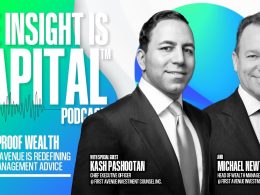7 Steps to Transitioning Your Firm
by Commonwealth Financial Network
 Advisors work hard for years, even decades, to build the businesses they have today. If you’re in the independent channel, chances are that your business is one of your largest personal assets, if not the largest. Which means transitioning your firm to the next generation is a big responsibility—one that you want to do right.
Advisors work hard for years, even decades, to build the businesses they have today. If you’re in the independent channel, chances are that your business is one of your largest personal assets, if not the largest. Which means transitioning your firm to the next generation is a big responsibility—one that you want to do right.
If you have acquired practices and books of business in the past, you are familiar with the experience from the perspective of the buyer. But as a seller, there’s a different process to follow to ensure that the sale goes through seamlessly. Let’s walk through the steps you should take to make the best decision for your business and ease the path to succession.
The first and most critical step to putting your succession plan into action is determining your readiness to move on to a new phase in your life. There are four key areas to consider:
- Financial: How much will the sale of your business factor in to your ability to retire? Does your firm have the financial strength to appeal to a prospective buyer? What can you do to make it more profitable?
- Social: Your business has provided a social outlet for years. How will your social needs be met in retirement?
- Emotional: Your business has been one of your “babies.” Letting go can be difficult. Have you been able to detach emotionally from the business so that a new owner can step in and move it into the future?
- Psychological: Your identity has probably been tied up in large part with your business. How will you define yourself when you are no longer the business owner?
Once you’ve explored these questions and feel you’re fully ready to sell, all other aspects of the transition should fall into place.
How do you find the perfect buyer? As you begin your search, you’ll want to consider key attributes that will be important for a successful transition. Think about individuals’ experience, personality, compatibility with your business model, client service standards, and ability to retain staff. I find that an advisor’s personal network is by far the most lucrative resource for finding a buyer, including connections with wholesalers.
Your broker/dealer may also have resources for you to tap into. In addition, think about third-party brokers like Succession Resource Group and FP Transitions, as well as list services like Succession Link and Advisor Successions.
Once you’ve found a potential buyer, both parties should perform due diligence to ensure that it’s the right match.
What the buyer will be thinking. Potential buyers will look into the following information to help them decide whether purchasing your firm is in their best interest:
- Client and operations-related information: This may include a breakdown of your client base and revenue sources; copies of your business plans, compliance manual, and privacy policy; and your firm’s mission and vision statement and business type. Your firm’s partners, as well as its employees and their compensation and benefits, may also be part of the buyer’s review.
- Licensing and regulatory information: Depending on your business type, this may include your current Form U4 for you and your employees, Form ADV Parts 1 and 2, disciplinary history, audit documentation, and security and business licenses.
- Financial and tax information: Potential buyers may want to obtain your recent financial statements, tax returns, credit report, UCC filings, and correspondence regarding any audit or tax claims.
- Existing agreements: This could include copies of any real and personal property leases (including for office equipment), as well as partnership, insurance, marketing, vendor, and confidentiality agreements.
What you should be thinking. Given the vast amount of information potential buyers will want to know about your business, it’s essential that you review your firm from their perspective and ensure that everything is in order. Put your best foot forward by compiling a description of your client base, a profile of your staff, a breakdown or your business’s revenue sources, and an updated mission statement in advance. Being prepared with this kind of information will help you maintain control over how your business is portrayed as you enter into negotiations, as well as ensure that your buyer is set up for long-term success.
There are several common approaches to valuing your practice. One such approach is the multiples of revenue method, which determines a business’s value by comparing its key statistics with those of similar businesses that were recently sold. Although this method can be a helpful way to determine a starting point for negotiations, it is limited in that it doesn’t forecast future cash flows. In addition, there is often a lack of accurate information available on the sale of other advisory practices to use for comparison.
A more sophisticated solution is the income approach, which is based on estimates of the income that the practice will actually produce. This approach can take two forms:
- Discounted cash flow: In this method, cash flows are forecasted for a certain period of time and discounted back to the present day using a discount factor. A terminal value is calculated as well, using an assumed long-term growth rate. The parties involved are able to account for future internal and external risk, and they can predict what will be produced by the business going forward.
- Single period capitalization: This method is a pared-down version of the discounted cash flow approach. It assumes a normalized growth rate, and it calculates value by dividing next year’s adjusted cash flow by the capitalization rate (discount rate minus growth).
Although these methods can be challenging, given the complex calculations and unpredictable market cycles involved, they are often the most accurate ways to determine value.
There are a number of industry players who have carved a niche for themselves in the valuation arena. Consider reaching out to Succession Resource Group, FP Transitions, and 3X Equity for guidance in the valuation process.
Documenting the result of due diligence and negotiations is critical to ensuring that both parties are clear about what to expect in the transition. A buy-sell agreement can be used to formalize the specifications of transitioning your firm to your successor. This agreement should include the details of the business valuation, the terms of payment, and signatures from both you and the buyer.
Firms like Live Oak Bank and SkyView Partners are great resources to tap for SBA and conventional loan options. Your broker/dealer may be able to provide assistance, too. At Commonwealth, we offer financing support to buyers within our community. In addition, we have relationships with third-party lenders to whom we can make introductions if needed.
Once the deal has been crafted, it’s time to implement. Reach out to your broker/dealer to learn about business transition resources that may be available to you. For example, Commonwealth offers sellers and buyers a designated case manager who serves as their point of contact during the entire implementation process and quarterbacks the dozen or more operational areas involved in making the transition a success.
Another option is to designate a staff member at your firm to serve as a relationship manager for the transition. He or she can ensure that all parties involved—both at your broker/dealer and within the buyer’s firm—are on the same page to pave the way for a smooth transition.
Whether you’re planning to sell your business next year or 10 years from now, it’s never too early to start crafting your succession plan. It’s important to reflect on your business and its future often to help you stay on track toward meeting the goals you’ve set—whether that’s managing a milestone amount of assets or retiring at age 50. Anything you can do today to prepare for a successful transition, no matter when it might happen, will help ensure that your business and your clients end up in the best hands possible.
Have your started thinking about transitioning your firm to the next generation? What practices do you have in place today to ensure that you’re prepared when the time comes to find a buyer? Please share your thoughts with us below.
Commonwealth Financial Network is the nation’s largest privately held independent broker/dealer-RIA. This post originally appeared on Commonwealth Independent Advisor, the firm’s corporate blog.
Copyright © Commonwealth Financial Network
















